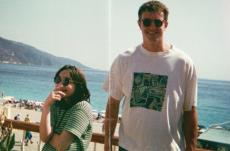『aftersun/アフターサン』 シャーロット・ウェルズ監督来日インタビュー/Director Charlotte Wells on “Aftersun”
NeoL / 2023年5月22日 17時0分
子どもの頃に父親と過ごした夏休みを、当時の父親と同じ年齢になった娘の視点から綴った映画『aftersun/アフターサン』が5月26日より全国で公開される。映画が描くのは、11歳の少女ソフィと普段は離れて暮らす父親のカラムが、トルコのリゾート地で過ごした一夏。思春期に差し掛かった娘と兄に間違われるほど若い父親は、まぶしい太陽の光を浴びながら、互いにビデオカメラを向け、かけがえのない時間を共に過ごしていた。そして20年後、大人になったソフィは、ローファイな映像の中に当時は知らなかった父の姿を見いだしていくー。監督・脚本は、本作が長編デビューとなったスコットランド出身のシャーロット・ウェルズ。ソフィの断片的な記憶とホームビデオの映像をコラージュのように映し出し、彼女の記憶を追体験するような没入感のある作品を実現した。また、カラム役を演じたポール・メスカルは、本作でアカデミー賞主演男優賞にノミネートされた。ここでは、日本公開を前に初来日を果たした監督のインタビューをお届けする。
→ in English
――とても美しい作品ですし、心を打たれました。厳密には自伝的な映画ではないそうですが、監督の人生からインスピレーションを得た部分もあるのでしょうか?
シャーロット・ウェルズ監督「まさに、それがスタート地点だったように思います。私が過ごした休暇や、子ども時代の数々の瞬間が、本作の枠組みの土台となりました。実際には劇中で描いた休暇を過ごしたわけではないし、劇中で描いた出来事があのような形で起こったわけではありません。でも間違いなく、この作品の持つフィーリングは私のものですし、親子関係の本質も私のものだと思っています」
――いつ頃からこの作品に取り組み始めたのですか?
シャーロット・ウェルズ監督「2015年です。本作は私が初めて手がけた映画(2016年に発表された短編『Tuesday』)から生まれたのですが、その作品も悲しみがテーマでした。描かれている時期は異なるけれど、最終的にはどちらも同じ物語の一部というか、少なくとも私自身の人生に関係しています。あの年は確か映画学校の夏休みに帰省したのですが、(子どもの頃の)休暇のアルバムをめくっていたら、写真の中の父がとても若く見えて、自分自身がその年齢に近づいていることに衝撃を受けました。同じ時期なのに、私たちの人生はまったく違って見えたんです」

――監督のお父さんも若かったんですね。
シャーロット・ウェルズ監督「私が生まれたとき、両親は21歳くらいでした。だから、ぜひ若い父親を描いてみたかったんです。私にとって、兄妹と間違われるほど父親の見た目が若いことが重要だったので、キャスティングは難航しました。最終的には、撮影時に25歳だったポール(・メスカル/カラム役)が30歳の役をとてもリアルに演じてくれました。彼は本当に素晴らしかったです」
――観客はカラムが問題を抱えていることに少しずつ気づいていくものの、具体的なことはわかりません。カラムの状態について、ポール・メスカルとは、どの程度詳しく話し合いましたか?
シャーロット・ウェルズ監督「かなり徹底的に話しました。脚本の書き方をコントロールするために、自分の中でカラムの問題について明確なイメージを持っておく必要があったんです。でも、観客に対しては、それを明確にするつもりはありませんでした。この映画は(大人になった)ソフィの視点から語られているわけで、彼女にとって、それは決して明確ではないからです。書き方には具体性を持たせる必要があったので、ポールにはそのすべてをシェアしたのですが、カラム自身が問題をちゃんと理解できていないでので、彼は私が伝えたことをすぐに忘れるようにしていました」
――背後からのショットや窓越しのショットなど、まるで観客がカラムを外から見つめているような映像が多いのが印象的でした。
シャーロット・ウェルズ監督「あれは大人になったソフィの視点を取り入れるための手段だったんです。鏡に映る反射を通して、のぞき見しようとしているような感覚を持たせるためでした。だからこそ、私たちは彼を少し離れた場所に置いて、何度も後ろから撮ったんです。カラムが一人でいるシーンは意識的にあのような撮り方をして、大人になったソフィの感覚を加えました」

――子ども時代のソフィを演じたフランキー・コリオは、どうやって見つけたのですか? 演技初挑戦だったと知って驚きました。
シャーロット・ウェルズ監督「本作のキャスティングディレクターを務めたルーシー・パーディは、長年にわたってアンドレア・アーノルド監督と仕事をしてきた人で、ストリートキャスティングによって新たな才能を発掘することで知られています。本作では約6ヶ月という長期のプロセスを通して、800名ほどの子どもたちから応募がありました。パンデミックの最中だったので、私たちはすべてをオンラインで進行し、最終的に残った16名と2021年2月にグラスゴーで対面したんです。フランキーはその中の一人だったのですが、とても目立っていて、信じられないほど特別で才能豊かでした。彼女には本人が気づいていない才能があったんです。私の仕事はできるだけ良い経験をもたらすこと、そして、その過程で彼女に楽しんでもらうことでした。楽しんでくれたんじゃないかなと思います」
――子役の俳優は、あえて子どもらしく演じようとしているのが見えてしまうことも少なくないですが、フランキーは本当に子どもらしいですよね。劇中のソフィを見ていたら、自分自身の子ども時代を思い出しました。
シャーロット・ウェルズ監督「そう言ってくれて本当にうれしいです。記憶にまつわる映画では、0.5秒の間に起こったような場面を振り返るので、特に慎重を要するんです。その瞬間の重要性を示すことができるのは、スクリーンに映し出す時間だけなので、現実よりもずっと長くイメージをキープすることになります。すると、とても観察力のある人物という印象になるのですが、子どもにはそんなに観察力があるわけではありません。そのまなざしを長引かせたいと思う一方で、それによって大人っぽさを与えてしまうという葛藤が生じるんです。彼女には本当に子どもらしくあってほしかったですし、私はスクリーンで早熟した子役を観るのにうんざりしていました。彼らはまるで大人のように話すんですよね。ソフィには子どもらしく鬱陶しくあってほしかったし、ふざけていてほしかった。ある意味、子どもらしく無関心であってほしかったし、また、子どもらしく真剣であってほしかったんです」
――子どものセリフを書くのは難しくないのですか?
シャーロット・ウェルズ監督「私は子どものセリフを書くのが大好きです。子どもとして書いていると、本当にひたむきになれるんです。例えば、ソフィが同じ空の下にいることについて話す場面がありますが、あまりにもひたむきなセリフなので、こっちが恥ずかしくなってしまいます。でも、そこもポイントで、彼女はとても深いことを言っているつもりなんですよね。それは世界における自分の立ち位置と、その広大さについて考えている、11歳の少女の視点に過ぎないんです」

――ソフィが12歳でも13歳でも、もしくは8歳でもなく、11歳という設定も完璧だと思いました。
シャーロット・ウェルズ監督「最初に直感で、ソフィは10歳か11歳だと思っていました。それから、身体の自由度が増し、親子関係においての依存も増すであろう、6、7、8歳だとしたらどうだろう、と考えました。そして、親子関係における依存が少なくて、彼女自身の世界にしっかりと立っているであろう、16歳だとしたらどうかな、と考えたんです。でも、11歳には両方の一番良い部分があるような気がしました。まだ自意識は足りないけれど、だからこそ、変わっていく瞬間を映画で見せられるのではないかと思ったんです。私にとって、それはカラオケのシーンなのですが、自意識が忍び寄る瞬間を映し出すことができました」
――カラオケのシーンは観ていてすごく辛かったです。
シャーロット・ウェルズ監督「私はカラオケが大嫌いなんです(笑)。カラオケは私を痛いほど自意識過剰にしてしまうので、できるだけ痛々しいシーンにしようと思いました」
――フランキーは本当に素晴らしかったです。
シャーロット・ウェルズ監督「私がフランキーに畏敬の念を抱いた瞬間はたくさんあるのですが、特に屋上のテラスで、親子がソフィの先生や学校について話しているシーンが素晴らしかったです。父親のカラムが好きな先生について話すと、彼女はただ彼のことを見て、ゆっくりと姿勢を正すのですが、あれは最高の演技でした。しかも、1テイク目ではなかったんですよ。フランキーは本当に特別なんです」

――色彩についてもお聞かせください。この映画は90年代の色彩を見事に捉えていますね。
シャーロット・ウェルズ監督「ありがとう! 私たちはカラーグレーディングにたくさんの時間を費やしました。カラリストいわく、こんなに時間をかけた映画はこれまでになかったそうです。撮影監督のグレゴリー(・オーク)と私がカラリストに送った、私的な休暇の写真がこの映画のルックの基盤となりました。マゼンタのスキントーンやターコイズの空といったような、35ミリのインスタント写真のような映画は、あまり前例がなかったんです」
――ホームビデオの映像も懐かしかったです。昔は特別なイベントをビデオに撮っていたけれど、ほとんどの場合は2度と観なかったような気がします。
シャーロット・ウェルズ監督「きっと2度と観ないことが重要なんだと思います。あの映像が特別なのは、写真のようにその瞬間を上書きしないからだと思うんです。何度も繰り返し見ていると、急にその瞬間よりも、写真のことをよく知っている状態になるんですよね。でもビデオを観ると、その時間と場所に引き戻されて、一コマ見ただけでも、頭の中でその周りの空間が埋め尽くされます。それがまさにこの映画が描いていることなんです」
――本作には90年代の音楽もフィーチャーされていますが、監督はキャストのために事前にプレイリストを作ったそうですね。
シャーロット・ウェルズ監督「『aftersun/アフターサン』のプレイリストを作って、それからカラムのプレイリストとソフィのプレイリストも作りました」
――ソフィ用も作ったんですね。
シャーロット・ウェルズ監督「フランキーは嫌がっていました。『オリヴィア・ロドリゴはどこ? 入ってないんだけど』って(笑)。彼女の両親の方が私と年齢が近いので、『よし、フランキー、車の中で90年代の音楽を聴くぞ!』と喜んでいました。フランキーは全然お気に召さなかったのですが、ポールはプレイリストを聴いてくれたし、自分でも作ったそうです。それが役作りの一環だったんだと思います」

――R.E.M.の「Losing My Religion」は、カラオケのシーンに完璧な選曲ですね。なぜあの曲を選んだのですか?
シャーロット・ウェルズ監督「子どもの頃によく聴いていた、とても親しみのある曲だったんです。私の父がR.E.M.を聴いていました」
――まさに90年代を代表する曲ですよね。
シャーロット・ウェルズ監督「90年代っぽいですよね! 実は今回、日本に到着した日に、ホテルに荷物を置いて、すぐに新宿のラーメン屋に行ったんです。席についた途端にあの曲が流れてきて、『やめてー! 取り憑かれてる!』と思いました。ドッキリかと思った(笑)」
――クイーンとデヴィッド・ボウイの「Under Pressure」がフィーチャーされたシーンも素晴らしかったです。歌詞を気にして聴いたことがなかったのですが、今後はこれまでと同じ気持ちで聴くことはできないと思います。
シャーロット・ウェルズ監督「おかしなことに、私もあの曲をあんな風に聴いたことがなかったんです。ボーカルだけのバージョンの存在も知っていたのですが、ただ斬新な感じですごいなと思っていました。再生ボタンを押して最後のシーンに合わせてみるまで、歌詞の内容には気づいていなくて。あの曲に新しい意味がもたらされたような気がします」

――この映画は観客に長い余韻をもたらします。なぜこんなにも人々に強いインパクトを与えるのだと思いますか?
シャーロット・ウェルズ監督「物語の微妙なラインを歩きながら、観客が感じ、解釈するためのスペースを提供するのが、このスタイルの映画制作における特有のものなんですよね。本作には観客のためのスペースがあるんです。それが、この映画が多くの人の心に届き、その後の会話につながった理由の一つだと思います」
――観客からの反応で驚いたことはありますか?
シャーロット・ウェルズ監督「カラムの精神状態について、観た人が個人的な体験を共有してくれたり、劇中での描写に反応してくれたりしたことです。しかも、親世代でもなく、90年代に子どもだったわけでもない、20代前半の若者が多かったんです。ある意味、彼らは新世代なわけですが、世界中のどこにいても、この映画に最も注目してくれるのはあの世代だったようで、それはとても興味深かったです。
あとはロンドンでの上映会で、映画を観てから登壇したフランキーが泣いたんです。『フランキー、どうしたの?』と聞いても泣き止まなくて。『なんだか急にわかった。どうしてこんなに悲しい映画を作ったの?』と。ちゃんと映画を観て、感じてくれたんだと知って、私は衝撃を受けました。彼女はこの映画と繋がったわけです。彼女がこの映画を映画として観ることができたことに、私はとても驚きました。私ですら、本作を観てそのような体験はできていないので、ちょっとうらやましかったです」
――最後に『aftersun/アフターサン』を楽しみにしている日本の映画ファンに、伝えておきたいことはありますか?
シャーロット・ウェルズ監督「すべての期待を忘れて、できるだけ多くを読まずに観てほしいです。とはいえ、これを読んでいるということは、おそらく本作について読んでいるのかな。あとは、とにかく辛抱強く、心を開いて、劇場で観てほしいです」

Text nao machida
『aftersun/アフターサン』
5月26日(金)ヒューマントラストシネマ有楽町、新宿ピカデリーほかにて全国公開
http://happinet-phantom.com/aftersun/
監督・脚本:シャーロット・ウェルズ(初長編監督作品)
出演:ポール・メスカル(ドラマ「ノーマル・ピープル」『ロスト・ドーター』)、 フランキー・コリオ、セリア・ロールソン・ホール
原題:aftersun/2022年/イギリス・アメリカ/カラー/ビスタ/5.1ch/101分 字幕翻訳:松浦美奈 映倫:G
© Turkish Riviera Run Club Limited, British Broadcasting Corporation, The British Film Institute & Tango 2022
後援:ブリティッシュ・カウンシル 配給:ハピネットファントム・スタジオ

――This film is so beautiful and heartbreaking at the same time. I understand that it's not exactly autobiographical, but is it inspired by your life to some extent?
Charlotte Wells: Yeah, exactly. I think that was the starting point. Holidays that I was on, moments from throughout childhood, they formed the basis of outline that I worked from. I wasn't on this holiday, these events didn't take place as they take place in the film, but certainly, the feeling of the film is mine and I think the essence of the relationship is mine.
――When did you start working on this project?
Charlotte Wells: It was like 2015. I think it was born from the first film that I made, which was also about grief and it kind of takes place at different points in time. But it's ultimately part of the same story, at least as it relates to my own life. And I think I had been to home that summer between years in film school, and flipping through on holiday albums and looking at these photographs and being struck at how young my dad looked and I was reaching that age myself. And our lives look very different at that point in time.

――So you really had a young dad.
Charlotte Wells: My parents were 21 or so when I was born. So I definitely was interested in portraying a young father. It was important to me that he look young, too, and they could be mistaken for siblings. That was a challenge we had when casting. Ultimately Paul [Mescal who played Calum] was 25 when we shot this playing a 30-year-old very believably. He's really wonderful.
――We start noticing that Calum has problems gradually, but we don’t know what exactly he goes through. How much in detail did you discuss with Paul about Calum’s condition?
Charlotte Wells: Very thoroughly. I had to have a very clear image for myself of what was wrong with Calum, so that I can control how I wrote it. And it was never my intention to make that clear to the audience, because it can never be clear to Sophie whose perspective this film is told through. And yet, I still had to have specificity in how I wrote it. I shared all of that with Paul but he tried to forget it as quickly as I told him, because Calum doesn't fully understand what's wrong.
――I noticed there are many shots of Calum from behind or through the window, as if we are watching him from outside.
Charlotte Wells: That was our way of infusing Sophie's point of view as an adult into those scenes, to have this kind of the feeling of a voyeur of somebody's point of view straining to see through a mirror, to see through a reflection to try to see more, which is why often we did shoot him from behind to kind of keep him at arm's length. We shot a little bit further away for the most part. So it was definitely our intention to shoot in that way. The scenes on which he was alone, to give that feeling of adult Sophie.

――Frankie Corio who played Sophie was amazing, too. I can’t believe this is her first time acting. How did you find her?
Charlotte Wells: My casting director, Lucy Pardee, she's worked with Andrea Arnold for many years and she's known for discovering new talent in street casting. We had a long process, almost six months, and we had submissions from around 800 kids. It was during the pandemic so it was all virtual, and eventually, we met 16 in person in Glasgow in February of 2021 and Frankie was one of them. And that's where she really stood out, incredibly special, incredibly talented. Talent she didn't know she had. My job was just to give her the best experience that I could, make sure that she had fun along the way. I think she did.
――Sometimes, you can tell when child actors are trying to act like a child. But she's really a child and I thought that was really sweet. Watching her reminded me of my own childhood.
Charlotte Wells: I really appreciate you saying that. I think it's tricky especially you're making a film about memory, because you're looking back at moments which may have happened in half a second. And the only way to show their importance is duration on screen. So you're holding images much longer than they would have been held in your eye. That gives the impression of a character who's very observant, but kids aren't that observant. So you have this kind of push and pull of wanting to allow a gaze to linger, but also that gives a maturity to a kid. And I really wanted her to feel like a kid. I was tired of seeing these really precocious kids on screen. They felt like adults who talked like adults. I wanted this to be a kid annoying like a kid, goofy like a kid. Kind of oblivious like a kid and also really earnest like a kid.
――Is it difficult to write dialogue for kids?
Charlotte Wells: I really like writing dialogue for kids. I think you can be really earnest as a kid. Like the sequence where she's talking about being under the same sky, the dialogue makes me cringe because it's just so painfully earnest. But that's also the point. She thinks she feels like she's saying something very profound. It's just her perspective as an 11-year-old thinking about her place in the world and the vastness of it.

――I thought Frankie being a 11-year-old was perfect, like not 12, not 13 or not eight.
Charlotte Wells: It was my first instinct that she'd be 10 -11. And then I considered what it would be for her to be 6, 7, 8 and have more freedom in body and also more dependence in the relationship. And I thought about what it would mean for her to be 16 and have much less dependence in the relationship and much more firmly in her own world. But 11 felt like the best of both. Still lack of self-consciousness, but then I could show that moment, that transition in the film. I could show that moment of self-consciousness creeps in which for me is in karaoke.
――That karaoke scene was so devastating!
Charlotte Wells: I hate karaoke [laughs.] It makes me painfully, painfully self-conscious. So I wanted as painful a karaoke scene as possible.
――She really was amazing.
Charlotte Wells: She was amazing. There are so many moments in the film, I really am in awe of her performance, particularly the scene on the rooftop terrace, where they're talking about her teacher and school and shuffling the cards. He talks about this teacher that he likes, and she just looks at him and she slowly sits up. It's just the most amazing performance! Like, truly amazing, and it wasn't the first take either. She's very, very special.

――I also want to ask you about the color of this film. You captured the color of the 90s so well.
Charlotte Wells: Thank you! We spent a lot of time in the grade. My colorist said it was the longest she'd ever spent on a film. And Greg the cinematographer and I, we'd compiled our own holiday photographs and sent them to her, so that was the basis of the look in the film. It wasn't so much other films that was like 35-millimeter instant photography, like magenta skin tones and turquoise skies.
――Also, those clips from their home video brought me back in time. I remember how we used to film special events even though you would never watch it again most of the time.
Charlotte Wells: I think it's important that you don't really watch it again. I think that what makes that footage so special is you don't overwrite the moment the way you deal with photographs. Looking at them over and over again, you suddenly know the photo much more than you know the moment. Because when you see the video footage, you're really brought back to that time and place and even as you see a frame, your mind fills in the space around it. That's really what this film is about.
――As for the 90s music featured in this film, I read that you made a playlist for the cast?
Charlotte Wells: There was an Aftersun playlist. And then there was a Calum playlist and there was a Sophie playlist.
――You made one for Sophie, too?
Charlotte Wells: I did yes, Frankie hated it. She was like, "Where's Olivia Rodrigo? It's not here." [laughs] Her parents who are much closer to my age, they were so excited. They were like, "Alright, Frankie, you are listening to all the 90s music in the car!" And she didn't like it at all. I think Paul listened to it and he made his own, too. I think that was part of his process.

――"Losing My Religion" was a perfect choice for that karaoke scene. Why did you select that song?
Charlotte Wells: It was a song that I knew really well, I'd heard a lot growing up. My dad listened to R.E.M.
――That song is so 90s.
Charlotte Wells: It's so 90s! And you know, I got here on Saturday night. I dropped my bags to the hotel and went into Shinjuku. I got some ramen. And it's the first song that came on when I sat down. I was like, “Noooo! it's following me!” I felt like I'd been set up [laughs.]
――Also, that scene with "Under Pressure" by Queen and David Bowie was amazing. I don't think I'd ever paid attention to the lyrics so much. I don't think I can never listen to that song in the same way again.
Charlotte Wells: It's funny, I hadn't heard that song that way really, either, even though I knew this version that was just the vocals. I thought it was amazing in a novelty kind of way. I didn't realize those were the lyrics until I hit play and they played over the last dance. And yeah, it kind of took on a new meaning.

――This film makes you think about it for a long time after watching it. Why do you think it has such a strong impact on people?
Charlotte Wells: I think it's inherent in this style of filmmaking, walking this line of narrative subtlety and providing space for an audience to feel and interpret, I suppose. There's space for the audience in the film. And I think that's in part, kind of why it has reached so many people and why it has engendered discussion afterward.
――What were some of the reactions that surprised you?
Charlotte Wells: I think the legibility of Calum's depression, people sharing their own experiences with that, and responding to its portrayal in the film. Those have meant a lot young people in their early 20s, who are neither parents nor were they kids in the 90s. They're kind of a new generation and yet, they seem to be most of the people that I look at up when I present the film, no matter where I am in the world. I think that's really interesting.
Also, Frankie, there was a screening in London, where she'd watched the film and came on stage crying. I was like, "Frankie, what's wrong?" She really couldn't collect herself. She's like, "It kind of hit me. Why did you make such a sad film?" It really struck me that she really saw the film, like she felt the film. She connected with the film. I was really surprised by that she was able to see it for the film that it was. Even I haven't had that experience watching it. It felt a little bit envious.
――Lastly, is there anything you would like to tell the movie fans in Japan who are looking forward to watching “Aftersun”?
Charlotte Wells: just to set aside all expectations, and to read as little about it as possible, even though they're presumably reading about it to get this far. And to just go in with patience and an open mind, and I think to see it in the theater.

Text nao machida
関連記事のまとめはこちら
https://www.neol.jp/movie-2/
外部リンク
この記事に関連するニュース
-
UESHIMA MUSEUM ANNEX オープンのお知らせ ~ 2025年1月15日より、今津景展を開催
PR TIMES / 2024年12月23日 15時15分
-
『ロマンシング サガ2 リベンジオブザセブン』煽り気味の皇帝にも注目!ザコとは違う圧倒的な七英雄との対峙【ゲームで英語漬け#153】
Game*Spark / 2024年12月22日 20時0分
-
この英語ってどんな意味?「apple of my eye」
OTONA SALONE / 2024年12月22日 7時0分
-
『セックス・アンド・ザ・シティ』クリスティン・デイヴィス、シャーロット愛用のリップ柄スカートを今でも持っている
クランクイン! / 2024年12月19日 15時0分
-
面接対策から日常会話まで、「日本語のオンラインプライベートレッスン」1月生・2月生の募集を開始!
PR TIMES / 2024年12月11日 17時15分
ランキング
-
1「通行人に暴言や舌打ち」東京駅前の“ウエディング撮影”が物議、JRは「許可が必要」
週刊女性PRIME / 2024年12月28日 19時0分
-
2「ぎゃあああ」 “セルフ給油中”の一幕を映した投稿が話題に!? ユーザーが思わず叫ぶ「恐ろしい光景」って何? ガソリンスタンドで“やってはいけないこと”とは
くるまのニュース / 2024年12月29日 8時30分
-
3エアコン暖房「つけっぱなし」と「こまめに消す」どっちが節電になる?プロに聞いた節電方法
女子SPA! / 2024年12月28日 8時47分
-
42024年に取ってよかったと思う資格ランキング、1位は? - 2位簿記、3位TOEIC
マイナビニュース / 2024年12月27日 9時39分
-
5大谷の愛犬「コイケル」知名度急上昇で「保護犬団体が頭を抱えるワケ」。飼い主が迷惑行為を受けるケースも
日刊SPA! / 2024年12月28日 8時54分
記事ミッション中・・・
記事にリアクションする
![]()
記事ミッション中・・・
記事にリアクションする

エラーが発生しました
ページを再読み込みして
ください











